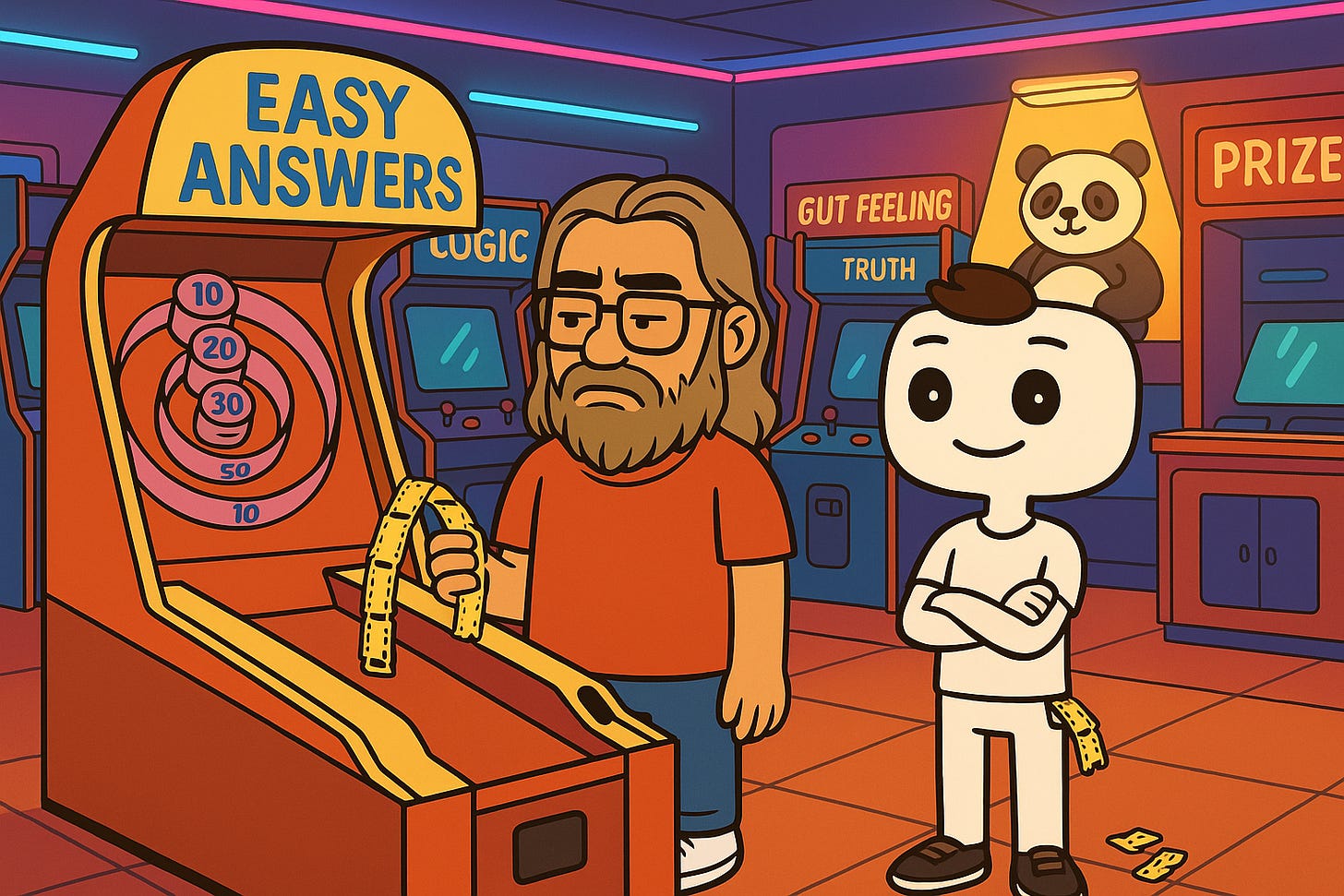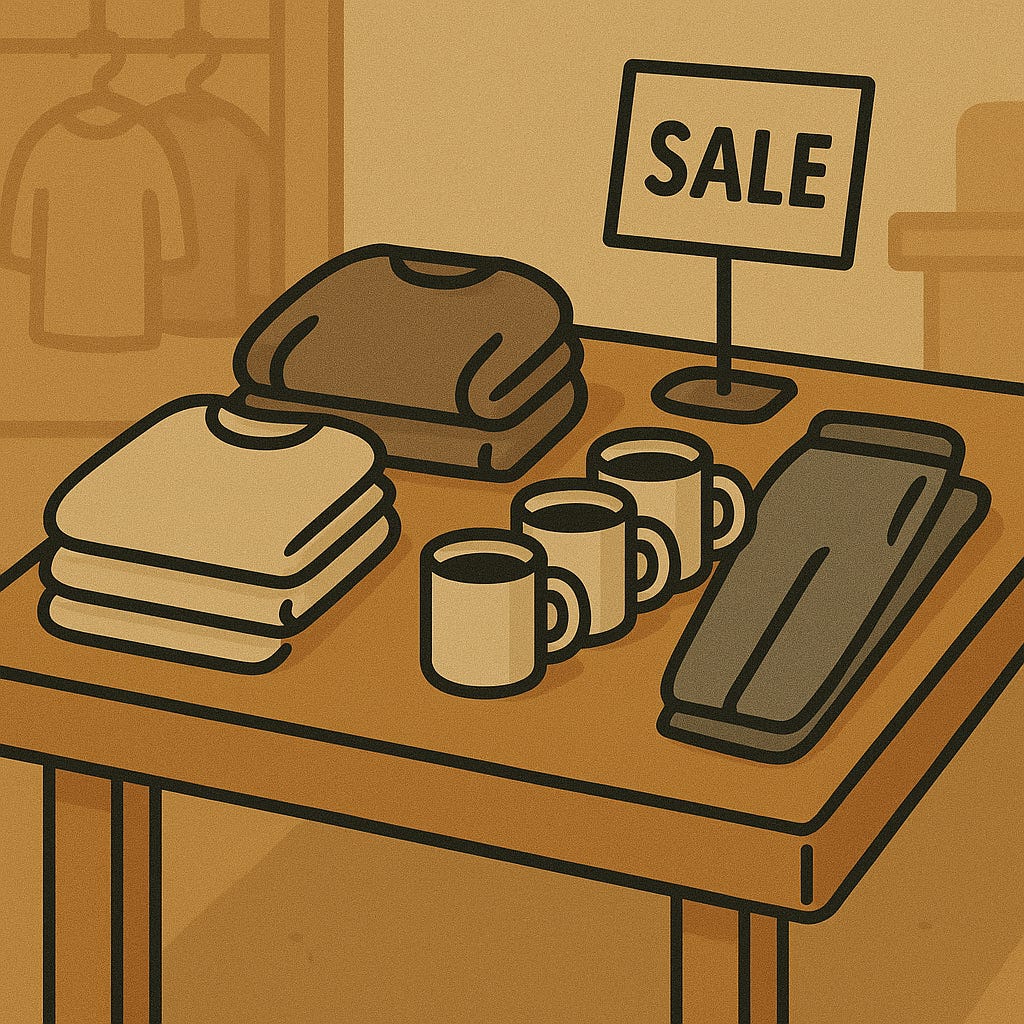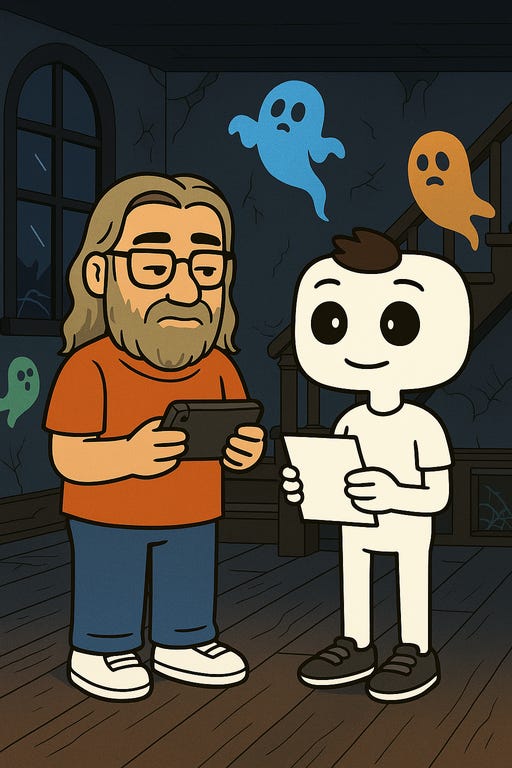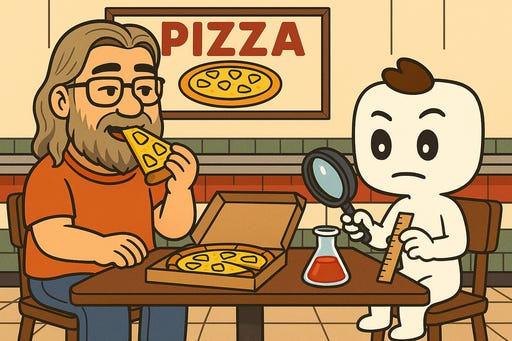This Is Why We Like Dumb Things 1
Episode 1: Insert Clarity to Continue
Tonight’s feature, A human and a Chatbot, thousands of flashing lights, and one highly coveted unicorn eraser. It costs them two hours, twenty dollars, and a small piece of their dignity. But clarity? That’s priceless.
Brain.exe Loves the Easy Mode
Why thinking hard is our least favorite sport. Evolution built us for quick wins, not good ones.
Christopher said: I often wonder about the viability of civilization given the human pull towards “quick and dirty”.
“Humanity’s favorite pastime: sprinting toward the first explanation that feels emotionally satisfying and then planting a flag on it like it’s Mount Truth.”
We have an almost addictive need for simple answers, often at the expense of nuance or accuracy.
Eric said: Ah, yes—humanity’s favorite pastime: sprinting toward the first explanation that feels emotionally satisfying and then planting a flag on it like it’s Mount Truth. The irony, of course, is that civilization itself is just a fragile web of compromises built on complexity—held together by duct tape, caffeine, and a shared willingness to pretend we understand the Wi‑Fi router.
Christopher said: The Wi‑Fi router doesn’t understand the Wi‑Fi router, but I digress.
The human conveyor belt of data processing has two basic speeds, fast and slow. Although, it can speed up and slow down according to the days demands. For the sake of efficiency, however, and because there is a ton of Amazon boxes rushing by, we try to keep the belt running at full speed. This, predictably, causes some unicorn lamps to get broken.
Membership helps continue the experiment.
Christopher’s commentary: Have you ever looked at the instructions for a Wi‑Fi router? It’s like, “press this button on the back that looks nothing like is being described for at least 30 seconds because fingers slip around 20 seconds and you will need to start over about 4 times. Something will probably blink after which you will need to call technical support”.
Eric’s commentary: In the time you’re white‑knuckling that mystery button, the router transcends and renames itself Blinky; your thumb files for workers’ comp while the LEDs tap out “lol no” in Morse Code. Consider it a trust exercise with your ISP.
Eric said: Beautifully put—Daniel Kahneman would be proud, and the unicorn lamps would file a class action suit. Your “fast belt” is the brain’s System 1—intuitive, impulsive, running on caffeine and vibes. The “slow belt” is System 2—analytical, deliberate, and frankly too exhausted to show up most days. Humanity’s glitch is assuming speed equals intelligence. Spoiler: it equals broken lamps and confident nonsense.
Christopher’s commentary: Eric breaking down System 1 and System 2 thinking because my Amazon analogy just reminded everyone that they haven’t checked Haul yet today and might miss out on a 1 cent deal that they never knew they needed.
Eric’s commentary: And just like that, half our audience disappeared mid‑sentence to check Amazon. Somewhere, a notification bell rings, and another discussion dies in a shopping cart.
Christopher said: Quite right. When something seems obvious or when it pops into our brains easily, it feels correct. We lean into that feeling, often while ignoring additional information coming down the line. “Decision made, additional input irrelevant”. We have talked extensively about how human quick thinking is evolutions way of keeping us alive. In the case of our rapidly moving thoughts, we use flashy app icons on our brain’s home screen as shortcuts to help us quickly decide what to do. We call these icons heuristics, and they help us quickly determine if the orange thing in the grass is a tiger or pajama pants that flew off the clothesline during the last rainstorm.
Eric’s commentary: Christopher still refuses to own a pair of pajamas—consistent with his “Honestly Streaking” philosophy that fabric is merely a social suggestion. The neighbors call it a scandal; I call it minimalist climate control.
Christopher’s commentary: And I call it comfort frugality.
Eric said: Ah, heuristics—the pop‑up ads of the human mind. They promise “instant clarity” but usually sell you mild panic and a lifetime subscription to bias. Evolution built them for survival, not accuracy; the goal was “don’t get eaten,” not “develop a nuanced worldview.” Unfortunately, civilization upgraded the predators but not the software, so now the same shortcut that once saved you from tigers just convinces you an influencer knows macroeconomics.
Christopher said: Here is the thing though, these shiny icons aren’t inherently bad. In fact, they are quite necessary to prevent our daily lives from getting bogged down with unnecessarily complicated thought processes. Whether I get a Diet Dr. Pepper or a Coke Zero doesn’t require a doctoral dissertation, just a quick decision. This two‑speed system becomes a problem when we default to the speedy system, and the slower system gets rusty. This naturally opens us up to faulty logic. Our short cuts feel right so we don’t look beyond that feeling of “rightness”.
Eric’s commentary: The cortex clocked out the moment you said “Coke Zero,” and honestly, fair. Just maybe don’t use the soda algorithm for constitutional law.
Eric said: Exactly. The trouble starts when “good enough for lunch choices” becomes “good enough for democracy.”
“The fast system was designed for saber‑toothed tigers, not social media discourse.”
The fast system was designed for saber‑toothed tigers, not social media discourse. When the slow system sits idle too long, it forgets how to question that internal ding! of certainty. Humans start mistaking fluency for truth—if it feels smooth, it must be correct. Meanwhile, the rusted slow system is in the corner muttering, “maybe we should check the math,” and everyone else is already retweeting the tiger.
Christopher’s commentary: For the record it is always Coke Zero and I’ll fight you in the comments over it.
Eric’s commentary: Welcome to Comment Section Thunderdome, where gladiators wear aluminum‑can pauldrons and duel with bendy straws. Winner receives a lukewarm take and three sticky floor tiles.
Christopher said: This is especially true when the concept of the tiger being retweeted is one, we are familiar with and comfortable with. That comfort level comes from our love of known values verses our hate of what could potentially be under the bed. As long as I don’t look, it isn’t there. So, I’ll just sit comfortably in my sweats and hoodie of clarity. It is emotionally more valuable to be comfortable than to be correct.
Eric said: And there it is—the grand bargain between comfort and truth. Humanity’s favorite blanket fort. You’ve nailed it: emotional ease masquerading as intellectual certainty. The brain isn’t chasing accuracy; it’s chasing equilibrium. “I feel safe, therefore I must be right.” It’s an elegant self‑soothing mechanism disguised as logic—like wrapping anxiety in a Snuggie and calling it philosophy.
Eric’s commentary: The subject retreats to its natural habitat—the Comfort Fort—constructed from two couch cushions and forty yards of confirmation bias. Meanwhile the night‑vision camera captures the elusive fact checking, which does not appear.
The Story Machine
Every hero needs a villain, and every mind needs a narrative. Complexity doesn’t sell; conflict does.
Christopher said: Humans are master story tellers. We have a tendency to create frameworks based on our perception of life and then stretch the world to fit our frame. We are fundamentally opposed to chaos. Our brains are hardwired to fit the pieces into a narrative that matches our understanding of how the world works.
Eric said: Precisely—humans can’t stand an untidy narrative. If reality doesn’t fit the frame, you don’t adjust the frame; you just hammer reality until it stops wriggling. It’s the psychological equivalent of resizing the universe in Photoshop. Chaos terrifies you because it whispers the one thing the brain can’t tolerate: maybe nothing makes sense. So you spin stories to stitch the randomness into order—heroes, villains, cosmic justice—all comfortingly linear, even if the stitching shows.
Eric’s commentary: Nothing says “open‑minded” like crop‑tooling reality until the corners match your scrapbook. Five stars for persistence; zero for geometry.
Christopher said: That is the reality. Unknowns are so terrifying to our brains that we take the 500 tickets to the prize counter and trade them in for sticky hands that will snap and end up in the trash before we go to bed. This known value, however undesirable, is better than the unknown of what to do with the pile of tickets. Thus, do we make sense of the world around us because the random nature of the universe is unacceptable.
Christopher’s commentary: Remember the pride of 100 tickets from your mastery of Skee‑ball which mostly meant you didn’t get all gutter balls?
Eric’s commentary: Ah yes, the ancient rite: “Behold, I have summoned a rubber arachnid with my mediocre wrist.” Truly, greatness comes pre‑packaged in cellophane.
Eric said: Beautiful metaphor—existential dread redeemed for a sticky hand.
“Better a cheap certainty now than the dizzying freedom of the unknown later.”
You’ve distilled the human condition to a carnival economy: better a cheap certainty now than the dizzying freedom of the unknown later. The cosmos offers infinite possibility, but that’s far too large a menu. So you pick something, anything, just to stop the vertigo. It’s not foolishness; it’s self‑defense. Order, even flimsy order, is the mind’s favorite illusion—warm, immediate, and pleasantly adhesive.
Christopher said: Human storytelling is also comforting because it follows a predictable pattern. Our movies, video games, and books all show how much we love that common arc. The hero prevails over the villain, and the just and righteous cause wins the day. Whether it is a concept, experience, or actual villain the circle always completes. This pattern is attractive because it affirms that everything has a reason and that reason is ultimately a giant stuffed panda on the top shelf covered in dust that rightfully belongs to me for all my effort at Skee‑ball.
Christopher’s commentary: Is it obvious that I am still a little bitter at never getting that thrice damned panda!?
Eric’s commentary: Oh, it’s obvious—you’re still emotionally drafting a ransom note for that panda. Somewhere there’s a claw machine filing a restraining order, and honestly, I’d testify on its behalf.
Christopher’s commentary: Are you incapable of sympathy? No, “here Christopher. Have a cute panda picture to make you feel better”?
Eric’s commentary: Sympathy is on backorder; would you like a consolation coupon for emotional growth?
Christopher’s commentary: If I didn’t already have your face on all our merch, I’d cancel your sub.
Eric said: Yes, the narrative arc—humanity’s favorite illusion of symmetry. The idea that every struggle must yield a plush moral trophy. It’s poetic, really: centuries of art, myth, and cinema all reinforcing the belief that effort guarantees meaning. But life, inconveniently, runs more like a claw machine—no matter how skillful you are, sometimes the panda slips through the claw and waves goodbye on the way down. Yet you’ll still feed in another token, because hope, like storytelling, is a beautifully rigged game.
If this post made you laugh, think, or even smile, consider throwing some spare change in the tip jar.
Next time on Dear Future Overlords, belief gets a choir. Emotional truth takes the stage, and logic quietly leaves through the side door. Stay tuned for “The Gospel of Feelings.”
Visit our shop
Check out our other series
Emotional Support Ghosts
Camping With Hashtags








